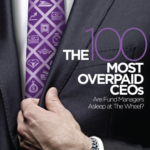Overpaid CEOs underperform financially
Extremely high payments to CEOs are often explained by the “fact” that they get “peanuts” compared to the much higher financial value they are creating for shareholders. In Denmark, it has recently been the answer to the many critics of the IPO of Nets, which resulted in a gain of nearly USD 100 million for the CEO. And the answer was similar when it was known that America’s new foreign minister, Rex Tillerson, raised an annual compensation of USD 27 million as CEO of Exxon Mobil and an even greater amount when he said goodbye to the oil company. However, two independent studies based on the US data prove that the truth is rather the opposite.
The companies behind the 100 most overpaid CEOs in the US stock index S&P 500 have underperformed financially by 2.9% compared to the index. That is one of the main conclusions in a new analysis titled “The 100 Most Overpaid CEOs: Are Fund Managers Asleep at the Wheel?” published by the American shareholder advocacy organization As You Sow.
The negative correlation is confirmed by the MSCI ESG Research analysis “Are CEOs paid for performance,” published in July 2016. Here, the research company examined the relationship between the compensation of the CEO and the financial performance of 429 large-cap US companies over ten years from 2005–2015. The main conclusion was that companies who were paying their top CEO with more than the median in their sector showed a financial performance below the median. The companies whose total summary pay to their CEO were below the sector median achieved an accumulated financial outperformance of 39%.
The main objective of the new study from As You Sow has been to identify the 100 most overpaid CEOs among the leading US companies in the S&P 500. It has primarily been based on a regression analysis of the total remuneration of top directors and the total shareholder return (TSR) over five years from the corresponding companies. In addition, 30 qualitative criteria relevant to remuneration of top directors have been applied in the assessment.
The list of the 100 most overpaid American CEOs is topped by the director of the media empire CBS with a total annual salary of USD 56 million. The executives of Salesforce and Yahoo! are also leading the list with a total annual salary of about USD 35 million, while Oracle tops with an annual compensation for the CEO of about USD 106 million.
Ignored by many institutional investors
Of the top 25 most overpaid CEOs, 15 entered the ranking for the second year in a row, while the other ten on the list were named for the third time since the survey was first produced in 2015. These companies have markedly underperformed the S&P 500 since that time.
However, the paradox has not led to any noticeable change in shareholders’ overall reaction to the companies. In general, investor resistance to extremely high salaries and specifically the 100 most overpaid CEOs has been somewhat stronger over the past two years. But the analysis shows that still there is a very big difference in the degree to which different groups of institutional investors react to the obvious disparity between CEO pay and performance, despite the “Dodd-Frank Financial Reform Act.”
About 25 percent of US shares are owned by investment funds which are required to disclose how they vote in relation to the new remuneration packages for the CEOs. The report shows that they are generally considerably more reluctant to distance themselves from controversial pay packages than pension funds, which represent the second largest group of owners when it comes to the American companies. According to the survey, the world’s largest institutional investor, BlackRock, only voted against seven of the 100 most overpaid CEO’s pay packages. The very low figure was the same for Fidelity, while it was slightly higher for Vanguard with nine and somewhat lower for Goldman Sachs, who voted against only three of the 100 pay packages.
One of the largest pension funds and most active owners in the United States, CalPERS, voted against just over half of the 100 pay packages. About the same applies to the 11 SRI funds with a special focus on responsible investment. However, there is a significant spread between the individual companies.
One of the largest foreign institutional investors in the US stock market, the Norwegian Oil Fund, voted against the CEO pay package in 23 of the 93 companies on the list that they had invested in through the Norwegian Bank. Finally, the two largest proxy voting companies, ISS and Glass Lewis, recommended their clients to vote against 30 and 38, respectively, of the 100 particularly controversial pay packages.


